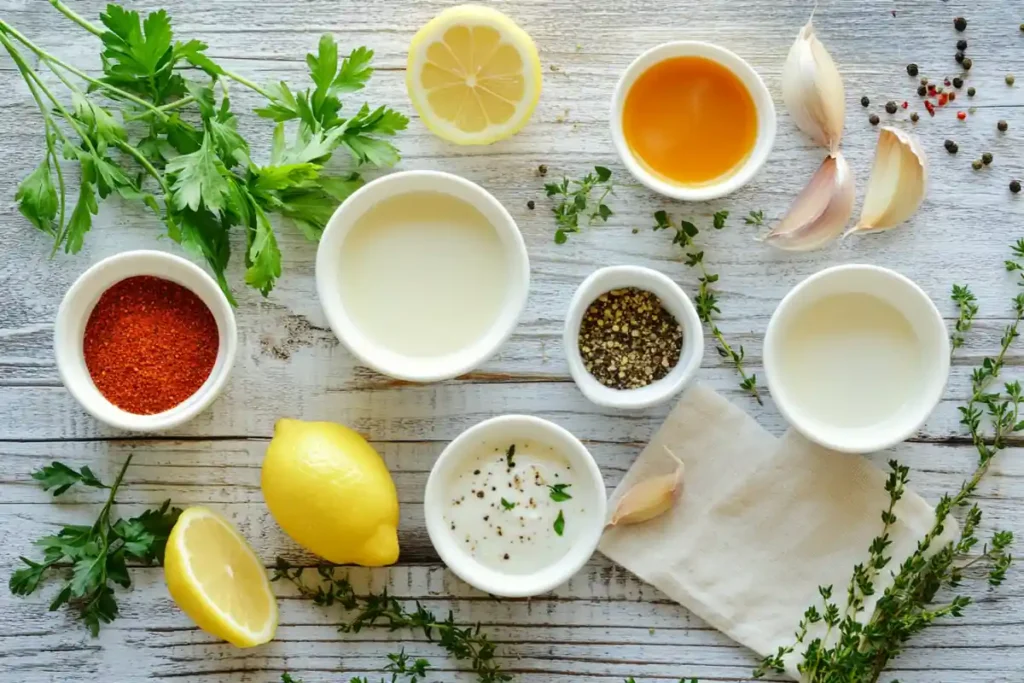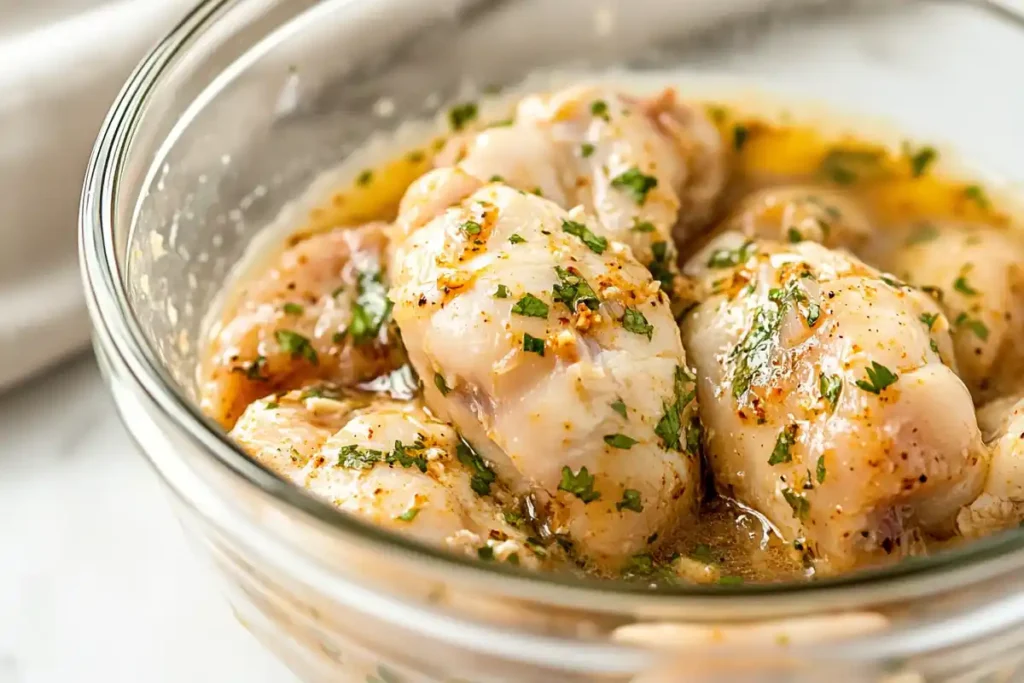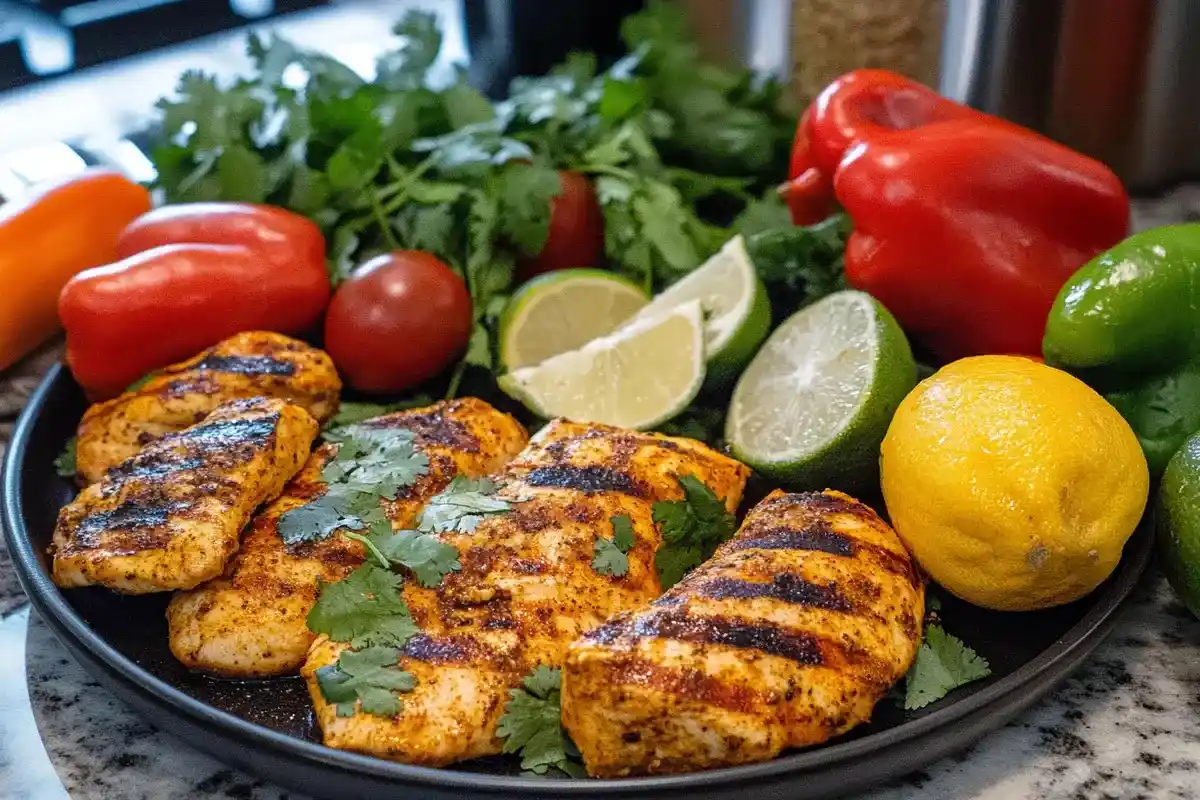When it comes to culinary mastery, Gordon Ramsay’s techniques for marinating chicken are as inspiring as they are effective. Whether you’re a seasoned chef or a kitchen novice, understanding how does Gordon Ramsay marinate chicken can transform your meals. This guide dives deep into his process, from the key ingredients like buttermilk and herbs to the precise cooking methods, offering practical tips and insights. By the end of this article, you’ll know the secrets behind his tender, flavorful chicken and how to replicate them in your kitchen.
Understanding the Importance of Gordon Ramsay Marinate Chicken
Marination isn’t just a step in cooking—it’s a game-changer. Gordon Ramsay emphasizes its significance in creating dishes that are as flavorful as they are juicy. Let’s explore the basics and why marination is a must.
What is Marination?
Marination is the process of soaking chicken or other proteins in a flavorful liquid mixture, typically including acids, oils, and seasonings. This process allows the ingredients to penetrate the meat, enhancing both taste and texture. Tender chicken marinated to perfection isn’t just a dream—it’s the result of careful preparation.
Why Marinate Chicken?
Chicken is a versatile but lean meat, and it can easily dry out during cooking. Marinating adds moisture and creates a protective layer that prevents overcooking. More importantly, it infuses the meat with layers of flavor. Ramsay often says, “Don’t just season the surface—let the flavor seep through.”
Key benefits of marinating include:
- Enhanced tenderness: Acidic components like buttermilk break down muscle fibers, resulting in softer meat.
- Improved flavor: Spices and herbs add depth, creating a taste that’s bold and aromatic.
- Balanced seasoning: The marinade evenly distributes flavors throughout the chicken.
Gordon Ramsay’s Philosophy on Marination
For Ramsay, marination is an art form. He advocates using fresh, high-quality ingredients and taking the time to let the flavors meld. His signature marinade recipes often include buttermilk for its tenderizing qualities, paired with bold spices like smoked paprika and cayenne pepper for a touch of heat.
By following Ramsay’s advice, you’re not just preparing a dish—you’re crafting an experience. Whether you’re frying, baking, or grilling, well-marinated chicken is the foundation of a spectacular meal.
Gordon Ramsay’s Signature Chicken Marinade Ingredients

A stellar marinade is more than a mix of liquids and spices; it’s a carefully curated combination that transforms chicken from ordinary to extraordinary. Gordon Ramsay’s signature approach focuses on fresh, high-quality ingredients, blending robust flavors to create a marinade that’s as aromatic as it is effective.
Essential Components
At the heart of Ramsay’s marinade is buttermilk, a staple known for its ability to tenderize meat and enhance moisture retention. Combined with olive oil, which provides a silky texture, and lemon juice or vinegar for a slight acidic kick, these components lay the foundation for a mouthwatering dish.
Key ingredients in the marinade:
- Buttermilk: Infuses tenderness and tanginess.
- Fresh Herbs: Adds an earthy depth. Parsley, thyme, and oregano are popular choices.
- Garlic: A powerhouse for flavor, bringing a sharp and savory note.
- Paprika and Cayenne Pepper: Provide color and a hint of heat.
- Salt and Pepper: Essential for balance and seasoning.
The Role of Buttermilk in Marination
One of the standout elements in Gordon Ramsay’s method is buttermilk. Its mild acidity breaks down proteins in the chicken, ensuring it stays tender and juicy during cooking. Additionally, it acts as a binder, helping spices and herbs cling to the chicken.
For a detailed exploration of marinating techniques and alternative ingredients, check out Zinas Guide to Chicken Marinades.
Seasoning: Spices and Herbs
Ramsay emphasizes using bold spices that create a well-rounded flavor profile. Smoked paprika and cayenne pepper add smokiness and heat, while garlic powder and fresh herbs build aromatic layers. The result? A marinade that’s perfectly balanced between savory and spicy.
Step-by-Step Guide to Marinating Chicken the Gordon Ramsay Way
Now that you know the ingredients, it’s time to dive into the method. Ramsay’s marinating process is straightforward yet precise, ensuring the chicken absorbs every ounce of flavor.
Preparing the Chicken
Before marinating, clean the chicken thoroughly and pat it dry with paper towels. This ensures the marinade adheres evenly. Depending on the recipe, you can leave the chicken whole or cut it into smaller pieces.
Pro tip: Score the chicken lightly with a knife to allow the marinade to penetrate deeper.
Creating the Marinade
In a mixing bowl, combine the following:
- 2 cups buttermilk
- Juice of one lemon
- 2 tablespoons olive oil
- 4 cloves minced garlic
- 1 teaspoon smoked paprika
- 1/2 teaspoon cayenne pepper
- Salt and freshly ground black pepper to taste
Whisk until the mixture is smooth and aromatic.
Soaking and Resting: The Marination Process

Place the chicken pieces in a large resealable bag or a covered bowl. Pour the marinade over the chicken, ensuring each piece is submerged. Seal the container and refrigerate for a minimum of two hours, though overnight marination yields the best results.
Tips for Maximizing Flavor
Use fresh ingredients: Dried herbs can work in a pinch, but fresh ones add a brighter taste.
Allow the chicken to reach room temperature before cooking: This ensures even cooking.
Don’t rush the marination time: The longer the chicken soaks, the deeper the flavor penetration.
Cooking Methods After Marination: How Does Gordon Ramsay Cook Chicken?
Marinating is just the first step in creating mouthwatering chicken. Once your chicken has absorbed the rich flavors of Gordon Ramsay’s marinade, it’s time to cook it to perfection. Whether you prefer frying, baking, or grilling, each method offers a unique texture and taste.
Pan-Frying vs. Deep-Frying: Ramsay’s Preferred Techniques
Frying chicken is a classic choice, and both pan-frying and deep-frying can yield crispy, flavorful results. Ramsay often recommends frying for its ability to lock in moisture while creating a golden, crunchy exterior.
- Pan-Frying Chicken After Marination: Ideal for smaller pieces like chicken thighs or breasts. Heat a skillet with oil over medium-high heat, and cook until each side is golden brown and the internal temperature reaches 165°F (74°C). This method ensures a crisp crust and juicy interior.
- Deep-Frying Chicken Gordon Ramsay Style: For larger batches or uniform results, deep-frying is the way to go. Ensure the oil is preheated to 350°F (175°C) to prevent sogginess. Fry in batches to avoid overcrowding.
Baking Marinated Chicken: A Healthier Option
If you’re looking for a less greasy option, baking is an excellent choice. Preheat your oven to 375°F (190°C) and arrange the marinated chicken on a baking tray lined with parchment paper. Bake for 25–30 minutes, flipping halfway through, until the chicken is fully cooked and lightly browned.
Key Cooking Techniques for Juicy, Marinated Chicken
- Resting After Cooking: Once the chicken is cooked, let it rest for a few minutes. This step allows the juices to redistribute, ensuring every bite is moist and flavorful.
- Basting During Cooking: If baking, brush the chicken with additional marinade or oil to keep it moist.
FAQs on Gordon Ramsay’s Marinated Chicken
Marinating can be simple, but it’s natural to have questions about the process. Here are some of the most common inquiries about how does Gordon Ramsay marinate chicken and how to optimize the results.
How Long Should You Marinate Chicken?
The ideal marination time depends on the cut and thickness of the chicken. Gordon Ramsay typically recommends at least two hours for the marinade to infuse the meat. However, overnight marination is best for deeper flavor and tenderness.
What Alternatives Can Be Used if Buttermilk is Unavailable?
If buttermilk isn’t available, you can substitute with yogurt or milk mixed with a tablespoon of vinegar or lemon juice. These alternatives replicate the tenderizing effects of buttermilk, ensuring juicy chicken.
Does the Marination Time Change for Different Chicken Cuts?
Yes! Smaller cuts like tenders or wings require less time (about 1–2 hours), while larger cuts like whole chicken or bone-in thighs benefit from overnight marination. Adjust accordingly to avoid over-marination, which can make the chicken mushy.
Can Marinated Chicken Be Frozen?
Absolutely! Marinate the chicken as usual, then place it in a freezer-safe bag and store it for up to three months. When ready to cook, thaw it in the refrigerator overnight. This method is perfect for meal prep and ensures flavorful chicken anytime.
For more recipes that pair beautifully with marinated chicken, explore Zinas Parmesan Crusted Chicken Recipe. Stay tuned for additional tips and tricks in the next sections of this guide!
Common Mistakes to Avoid During Marination
Even with the best ingredients and techniques, small missteps can affect the outcome of your dish. To ensure your chicken turns out tender, flavorful, and perfectly cooked, avoid these common marination mistakes.
Overseasoning or Underseasoning
One of the most frequent mistakes is overloading the marinade with too many spices or not using enough seasoning. Both extremes can lead to a dish that tastes unbalanced. Follow Gordon Ramsay’s principle of keeping it simple but impactful: use a handful of bold spices like smoked paprika or cayenne pepper and balance them with fresh herbs.
Skipping the Resting Time
Marination is a process that requires time for the flavors to develop and penetrate the meat. A rushed marination will result in surface-level seasoning rather than rich, deep flavors. For best results, let the chicken marinate for at least two hours, or better yet, overnight. When you ask, “How does Gordon Ramsay marinate chicken?”, his answer always includes patience.
Not Adjusting for Chicken Cut Thickness
Different cuts of chicken require different marination times. Thick pieces like drumsticks or bone-in thighs need more time compared to thinner cuts like tenders or fillets. Misjudging this can result in uneven flavor absorption
Expert Tips for Elevating Your Marination Game
Marinating chicken is an art, and Gordon Ramsay’s techniques provide a strong foundation. However, adding your own flair and following these expert tips can take your cooking to the next level.
Incorporating Unique Flavors
Ramsay’s classic marinade is a perfect base, but don’t be afraid to experiment with other ingredients. For instance:
Honey or Brown Sugar: Adds a subtle sweetness and helps create a caramelized crust when cooking.
Soy Sauce: Brings a touch of umami and depth.
Citrus Zest: Lemon or lime zest can enhance the brightness of the marinade.
By layering these flavors thoughtfully, you can create a marinade that’s uniquely yours while staying true to the techniques used in how does Gordon Ramsay marinate chicken.
Timing and Temperature Control
Timing and temperature can make or break your marinated dish:
Avoid Over-Marination: Leaving chicken in a marinade with acidic ingredients for too long can result in a mushy texture.
Room Temperature Before Cooking: Let the chicken sit out for 15–30 minutes before cooking to ensure even heat distribution.
When following these tips, you’ll find it easier to achieve the perfect balance of flavor and texture.
Why Gordon Ramsay’s Marination Stands Out
Gordon Ramsay’s marination methods are celebrated worldwide, not just for their flavors but for the meticulous attention to detail he applies. Let’s explore what sets his approach apart.
Focus on High-Quality Ingredients
Ramsay always stresses the importance of using fresh, high-quality ingredients. From the buttermilk to the herbs and spices, every element plays a role in enhancing the overall flavor. His philosophy is simple: “Great dishes start with great ingredients.”
Emphasis on Balance and Simplicity
One of the reasons Ramsay’s marinade recipes stand out is their balance. He combines acidity, sweetness, and spice in just the right proportions, ensuring that no single flavor overpowers the dish. This balance makes it easy to understand how does Gordon Ramsay marinate chicken with such consistent success.
Attention to Technique
From scoring the chicken to allowing ample marination time, Ramsay’s process is as much about technique as it is about the ingredients. By adhering to his methods, you can replicate his results with confidence, whether you’re preparing a weeknight dinner or a feast for guests.
Conclusion
Marinating chicken the Gordon Ramsay way is more than just a technique—it’s an art that combines quality ingredients, careful preparation, and a touch of patience. By following his methods, you can elevate your chicken dishes from ordinary to extraordinary, whether you’re frying, baking, or grilling. With the perfect balance of flavors and textures, marinated chicken becomes the highlight of any meal.
Remember, the key to mastering how does Gordon Ramsay marinate chicken lies in using fresh ingredients, allowing ample marination time, and paying attention to detail during cooking. Whether you’re preparing a casual dinner or an elegant feast, these tips and insights will ensure your chicken is always a culinary triumph.
Now it’s your turn to try it out! Experiment with flavors, follow Ramsay’s techniques, and enjoy the satisfaction of serving perfectly marinated chicken. For more inspiration and recipes, don’t forget to explore other guides and ideas to keep your cooking fresh and exciting. Happy cooking!
FAQs Section Based on ‘People Also Ask’
- What does Gordon Ramsay season his chicken with?
He uses smoked paprika, cayenne pepper, garlic, salt, black pepper, and fresh herbs like thyme or parsley for a balanced flavor. - What is the basic marinade formula for chicken?
The basic formula includes an acidic component (buttermilk or lemon), oil, and seasonings such as paprika, cayenne, and garlic. - How does Gordon Ramsay sear chicken?
Ramsay sears chicken by heating a skillet with oil until hot, adding seasoned chicken, and cooking until golden brown on each side for a crisp exterior. - How long do you marinate chicken for?
For optimal results, marinate for at least two hours, but overnight marination yields the most tender and flavorful chicken.
How long do you marinate chicken for?
For optimal results, marinate for at least two hours, but overnight marination yields the most tender and flavorful chicken.

